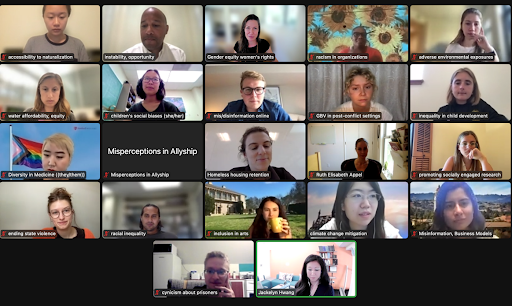How 25 PhD Fellows Are Spending Their Summer Vacation
(Hint: Working on Impact-Focused Research)

We welcomed the third annual cohort of Stanford Impact Labs’ Summer Collaborative Research Fellows on June 21 with a backyard picnic on a hot (hot!) summer solstice day. Alongside the PhD fellows, Professor Pascaline Dupas joined us to share how she “arrived at this moment” as Stanford Impact Labs’ co-founder and associate director, and pioneer of development economics. Pascaline noted the generational shift in academia towards more solution-oriented research, challenging the notion that either you are a real academic or care about the world, and that in fact, you can do both.
An interdisciplinary cohort of fellows
Our Summer Collaborative Research Fellowship supports highly motivated PhD students to work on impact-focused research with faculty mentors and research teams across Stanford, and community and policy partners beyond the university. Fellows benefit from the collaborative research environment, as well as weekly training and mentoring with our Stanford Impact Labs team, guest speakers, and other fellows.
We kicked off this year’s program with twenty-five PhD fellows who represent schools across the university, including:
- Our first participant from the music department, Doga Cavdir, who is working with people who are hard of hearing and an East Bay nonprofit in the performing arts;
- A joint Graduate School of Education and School of Medicine PhD fellow, Candice Kim; and
- Our first student from the business school, Preeti Srinivasan.
Other fellows come from civil and environmental engineering; communication; economics; the interdisciplinary program in environment and resources; management science and engineering; political science; psychology; and sociology. Two of our fellows are pursuing joint law degrees.
The majority of fellows are grappling with some of the biggest challenges of our time, including climate change, how the consumption of information is shaping our democratic society, and systemic racism. Several fellows bring expertise in critical race theory and explore how institutions can be more diverse and inclusive, and how to address inequities to move us towards a more racially just society.
A focus on partnership for social problems
In our first program session, we were joined by another Stanford Impact Labs’ associate director, Shelley Correll, professor of sociology, who shared her journey into problem- and partner-focused research to improve gender equality in the workplace. She detailed the “small wins” theory of change championed through the VMware Women’s Leadership Innovation Lab, where she is faculty director. She also reflected on trends she's seeing in the social sciences and higher education, including more panels at academic conferences dedicated to social impact.
Former Stanford Impact Labs’ design fellows, Professors Jackie Hwang (Sociology) and Alvin Pearman (Graduate School of Education, GSE), joined our second session to talk about how they navigated their understanding of the "problem and solutions landscape" to determine where and how their research might add value and increase the chances those research insights are taken up and used by policymakers, education leaders, community organizations, and others.
They shared deeply personal stories that motivate their efforts to address urban gentrification and the resulting racial and economic inequities in housing, education, and life trajectories. They were candid about the vulnerabilities as junior faculty in taking a less traditional, more partner-based, impact-focused approach to research, but also noted how this approach has contributed positively to their research pursuits. For example, Professor Hwang is undertaking a new qualitative research project inspired by her work with the city of Oakland on housing. And ultimately, as Professor Pearman shared, it is about being rooted in your authentic self: if you are a person committed to being a force for good, you also want to be a scholar committed to being a force for good.
In our session with Professors Hwang and Pearman, participants were asked to change their Zoom names to the problem they are working on, and reflect on how their research expertise, professional experience, and personal identity and experience shapes their understanding and perceptions of the social problem.
Creating research for impact with leaders outside the university
In our third session, PhD fellow Kia Turner (GSE) was joined by her research-practice partner from the Peer Defense Project, and her faculty mentor, Dr. Anne Charity Hudley, who leads the Black Academic Development (BAD) Lab, to talk with the group about how they approach co-creation in a way that centers voice, equity, and respect, and builds a practical foundation for generating better outcomes. The PhD fellows will have subsequent sessions on engaging policy makers and communicating academic research with non-academics. The fellowship ends with a session on “Pathways Forward: Impact-Focused Careers Within and Beyond Academia,” where we’ll be joined by Stanford Impact Labs Associate Director Alyce Adams and IDinsight CEO Ruth Levine.
Peer learning
One of the wonderful things about this program is the opportunity for peer learning. Some fellows, like Turner and several of her GSE colleagues, including Crystal Moore and Darion Wallace, have deep experience and mentorship around impact-focused scholarship and bring rich insights into partnership, community engagement, and co-creation best practices. For others, this approach to scholarship is relatively new. What holds this community together is their shared motivation to use their research skills to benefit communities and society more broadly; a growing community that Stanford Impact Labs is fostering across the university to leverage research for public benefit and social change.
